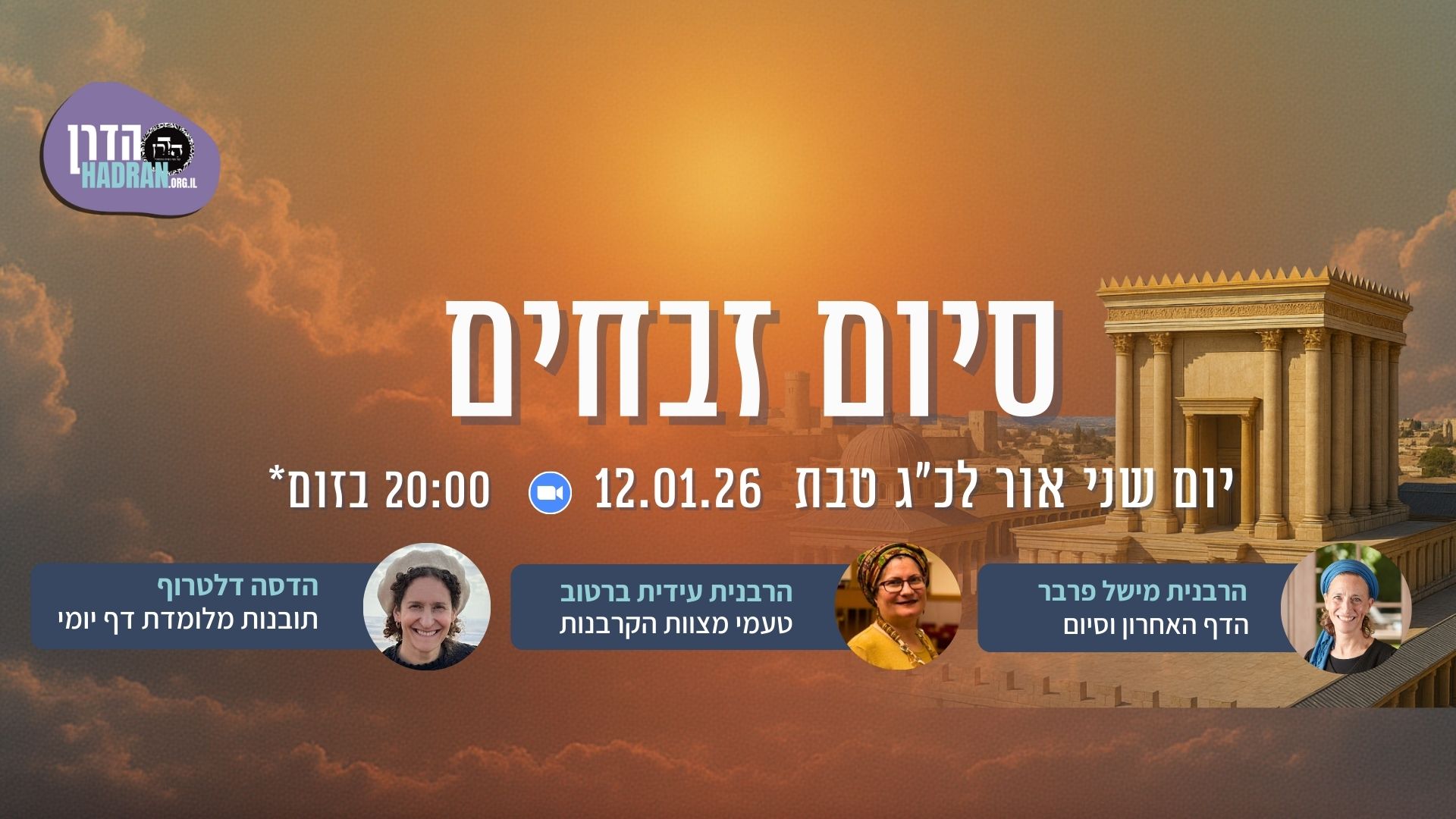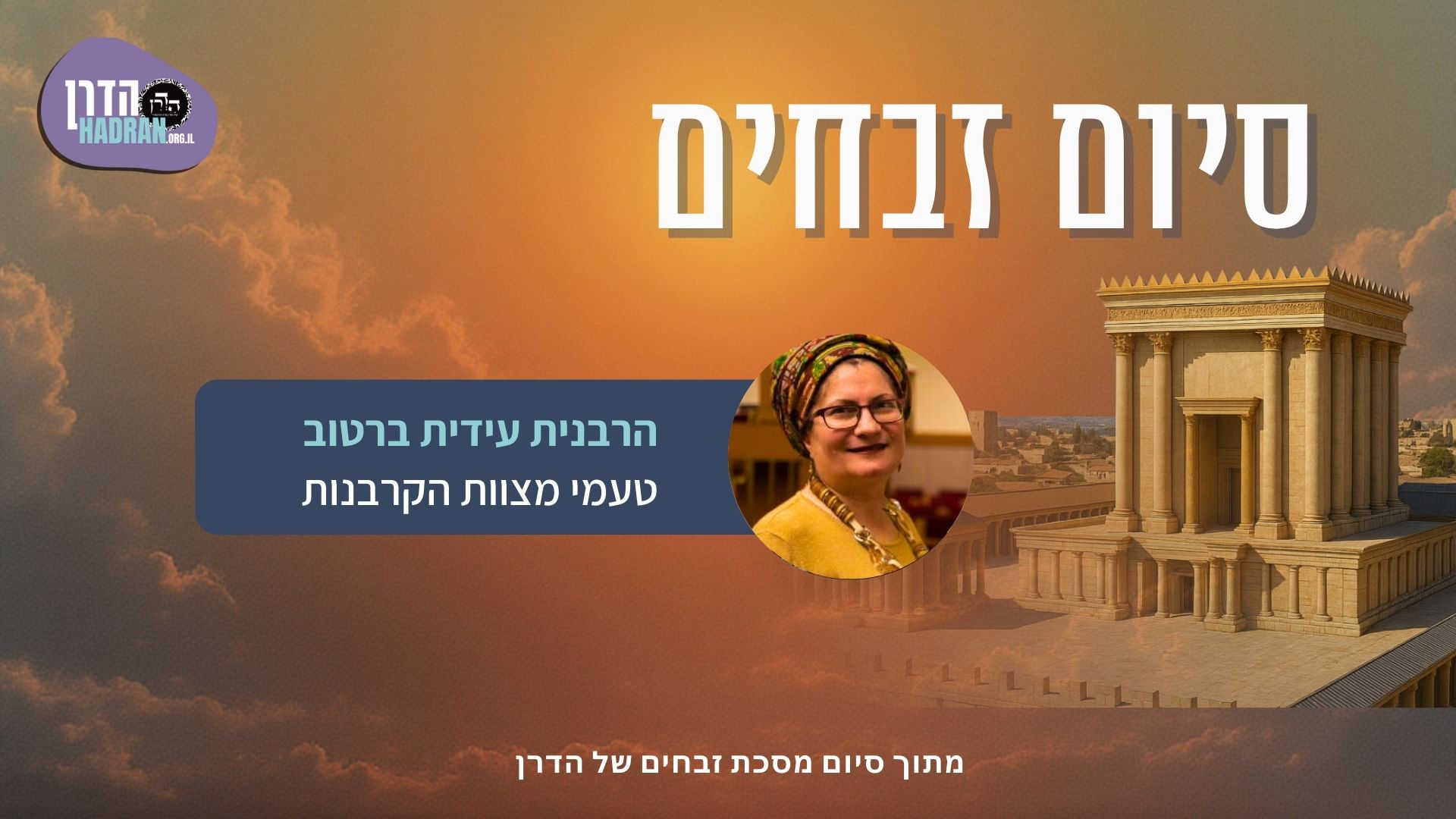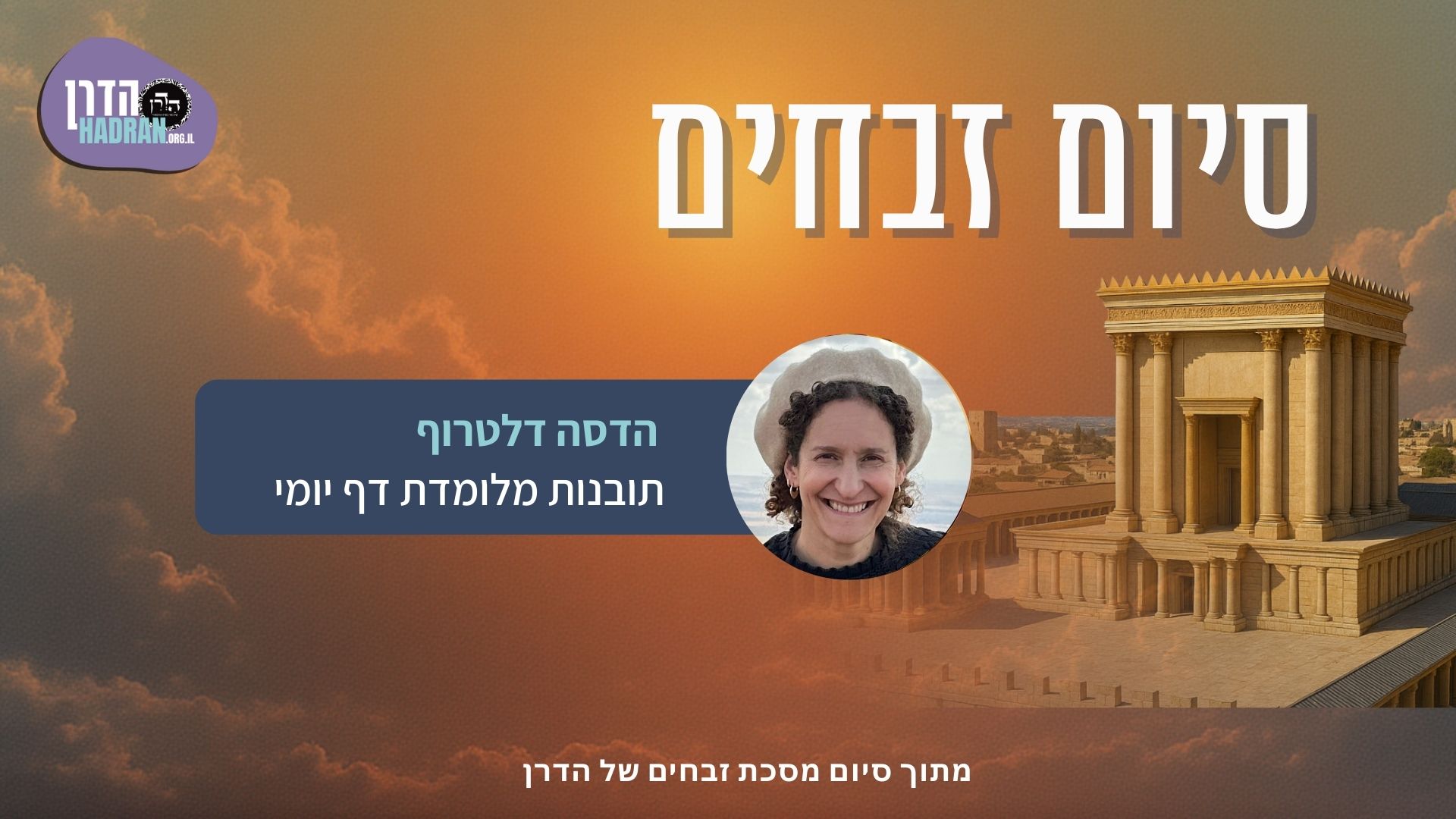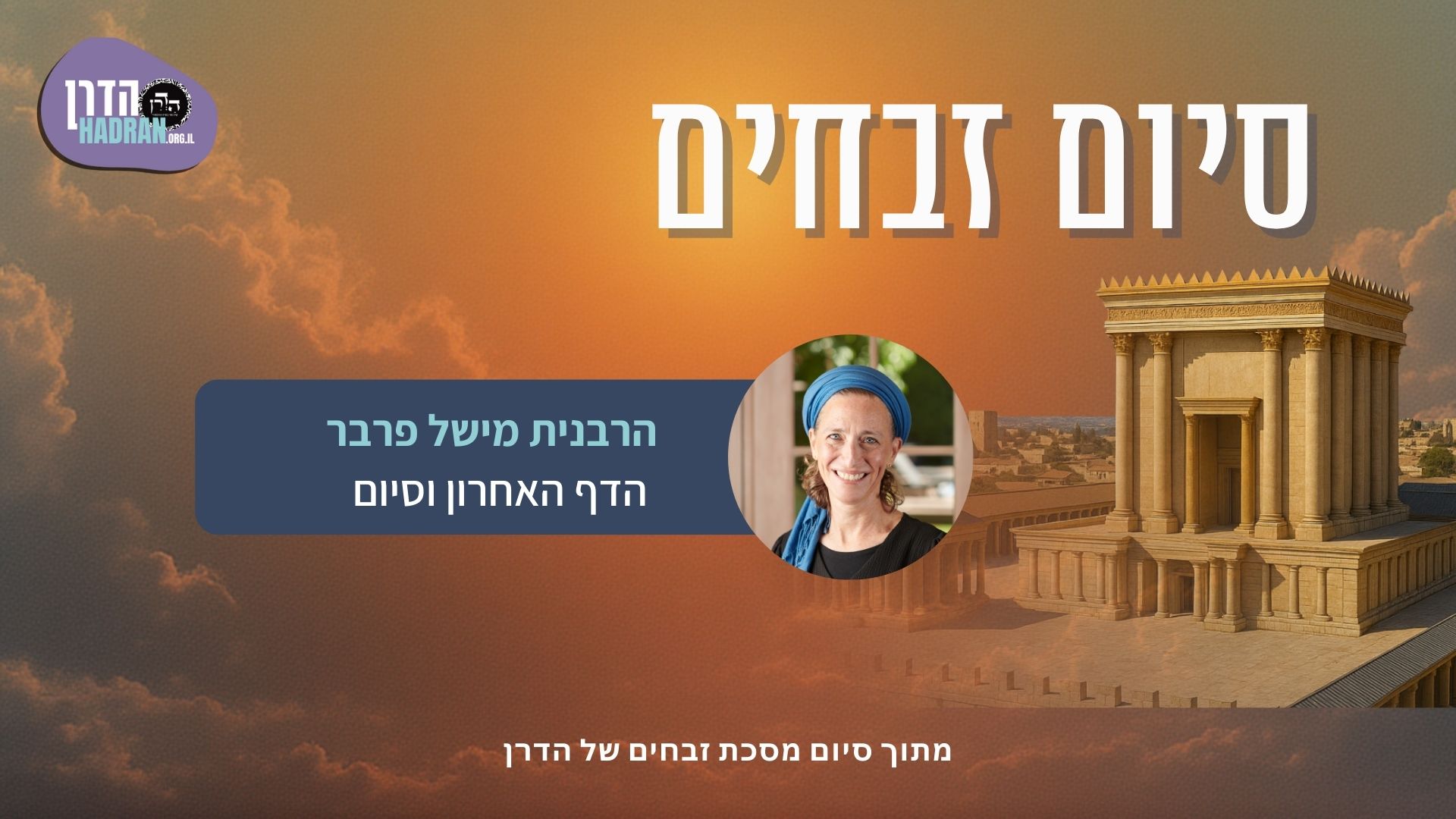מסכת זבחים
מסכת זבחים מוקדש ע”י אסתר קרמר לע”נ אביה מני גרוס.
הלימוד השבוע מוקדש לזכות ולשלום הַיְימׇנוֹט אֱמוּנָה בַּת באנצ’י (קָסָאוּ) בת 11 שנעלמה במקום מגוריה בצפת, לפני שנתיים, ביום ט”ז אדר תשפ”ד (25.2.24), ולא נודעו עקבותיה.
רוצה להקדיש שיעור?

תקציר
לאחר השוואת המשנה בזבחים למשנה מקבילה בתמורה, הגמרא מסבירה כי המשנה בזבחים נכללה כדי להדגיש שגם דבר האסור מחוץ למקדש – מאחר שהוא אסור בהנאה לגמרי – אינו מתבטל ויש להניחו למיתה. אולם הדבר מעורר קושי, שכן עיקרון זה נראה שניתן ללמוד ממשנה בעבודה זרה.
הפתרון הוא שהמשנה בעבודה זרה אינה עוסקת בפריטים המיועדים למזבח. לכן, אילו הייתה קיימת רק אותה משנה, היה מקום לחשוב שבענייני קרבנות יחולו דיני ביטול, כדי שלא להפסיד קודשים. לעומת זאת, אילו נלמדה רק המשנה בזבחים, היה ניתן לחשוב שהחומרה נובעת מכך שפריטים אלו מאוסים ואינם ראויים למזבח, אך בהקשרים שאינם מקדשיים אולי דיני ביטול כן יחולו.
לפי דין תורה, כאשר פריטים מותרים ואסורים מתערבים, האסורים מתבטלים ברוב אם המותרים הם הרוב. עם זאת, יש חריגים לכלל זה. מדוע, אם כן, בהמה אינה מתבטלת ברוב כאן? הגמרא מציעה תחילה שהבהמות נכללות בקטגוריה של דברים הנמכרים ביחידות (במנין), שאינם מתבטלים לפי דעת רבי מאיר. הסבר זה מתאים להבנתו של ריש לקיש את עמדת רבי מאיר במשנה ערלה ג:ו–ז, הכוללת דברים הנמכרים בדרך כלל ביחידות אך לעיתים גם שלא כך. אולם הוא אינו תואם את פירושו של רבי יוחנן לדעת רבי מאיר, הרלוונטי רק לדברים הנמכרים תמיד ביחידות – קטגוריה שאינה כוללת בהמות, שכן לעיתים הן נמכרות בעדרים.
כלים
מסכת זבחים
מסכת זבחים מוקדש ע”י אסתר קרמר לע”נ אביה מני גרוס.
הלימוד השבוע מוקדש לזכות ולשלום הַיְימׇנוֹט אֱמוּנָה בַּת באנצ’י (קָסָאוּ) בת 11 שנעלמה במקום מגוריה בצפת, לפני שנתיים, ביום ט”ז אדר תשפ”ד (25.2.24), ולא נודעו עקבותיה.
כלים
העמקה
רוצה להבין מה באמת קורה מתחת לפני השטח של הסוגיה?
שיעורים, פודקאסטים והרחבות של מיטב המורות שלנו יפתחו לך עוד זוויות וכיווני חשיבה.
חדשה בלימוד הגמרא?
זה הדף הראשון שלך? איזו התרגשות עצומה! יש לנו בדיוק את התכנים והכלים שיעזרו לך לעשות את הצעדים הראשונים ללמידה בקצב וברמה שלך, כך תוכלי להרגיש בנוח גם בתוך הסוגיות המורכבות ומאתגרות.
פסיפס הלומדות שלנו
גלי את קהילת הלומדות שלנו, מגוון נשים, רקעים וסיפורים. כולן חלק מתנועה ומסע מרגש ועוצמתי.
זבחים עב
צְרִיכִי; דְּאִי מֵהָתָם, הֲוָה אָמֵינָא: לְהֶדְיוֹט, אֲבָל לְגָבוֹהַּ אֵימָא לָא נַפְסְדִינְהוּ לְכוּלְּהוּ;
The Gemara explains that both the mishna here and the mishna in Avoda Zara are necessary, as, if this halakha had been learned only from there, the mishna in Avoda Zara, I would say that this applies only if the prohibited animal is intermingled with a non-sacred animal and thereby becomes prohibited to an ordinary person. But if it is intermingled with offerings that are designated to the Most High so a loss to the Temple would ensue, one might say that we should not lose all the valid offerings, and therefore the prohibited animal should be nullified in a simple majority. Accordingly, the ruling of the mishna here was necessary, to teach that the same applies to a mixture involving offerings.
וְאִי מֵהָכָא, הֲוָה אָמֵינָא: הָנֵי מִילֵּי קָדָשִׁים – דִּמְאִיס, אֲבָל חוּלִּין דְּלָא מְאִיס – אֵימָא: אִיסּוּרֵי הֲנָאָה (לִיבְטְלֵי) [לִיבְטְלוּ] בְּרוּבָּא; צְרִיכָא.
The Gemara continues: And conversely, if this halakha were learned only from here I would say that this statement, that the entire mixture is prohibited, applies specifically to sacrificial animals, as it is repulsive to sacrifice to God an animal from a mixture that includes a prohibited animal. But with regard to deriving benefit from a non-sacred animal from this mixture, which is not a repulsive act, one might say: Let the items from which deriving benefit is prohibited be nullified in a majority. Therefore, the mishna in Avoda Zara is also necessary.
וְנִיבְטְלוּ בְּרוּבָּא! וְכִי תֵּימָא חֲשִׁיבִי וְלָא בָּטְלִי – הָנִיחָא לְמַאן דְּאָמַר: ״כׇּל שֶׁדַּרְכּוֹ לִימָּנוֹת״ שָׁנִינוּ;
The Gemara questions the ruling of the mishna: But let the prohibited animals be nullified in a majority, as is the halakha concerning other matters, in which the minority items assume the status of the majority. And if you would say in response that animals are significant, as they are counted individually and therefore they are not nullified in a majority, this answer is unsatisfactory. The Gemara elaborates: This suggested answer works out well according to the one who says that we learned in the mishna discussing nullification in a majority (see Orla 3:6–7): Any item whose manner is also to be counted, i.e., that are sometimes sold by unit rather than weight or volume, is considered significant. This definition includes animals, as they are sometimes sold as individual animals, and therefore they would be considered significant.
אֶלָּא לְמַאן דְּאָמַר: ״אֶת שֶׁדַּרְכּוֹ לִימָּנוֹת״ שָׁנִינוּ, מַאי אִיכָּא לְמֵימַר? דִּתְנַן: מִי שֶׁהָיוּ לוֹ חֲבִילֵי תִּילְתָּן שֶׁל כִּלְאֵי הַכֶּרֶם –
But according to the one who says that we learned in that mishna: An item whose manner is exclusively to be counted, i.e., one that is always sold by unit, is considered significant, what can be said? Although animals are often sold by unit, they are occasionally sold as part of a herd, and would therefore not be considered significant. The Gemara cites the mishna in which this dispute appears. As we learned (Orla 3:6–7): With regard to one who had bundles of fenugreek, a type of legume, that were diverse kinds planted in a vineyard, from which it is prohibited to derive benefit,
יִדָּלְקוּ. נִתְעָרְבוּ בַּאֲחֵרִים (וַאֲחֵרִים בַּאֲחֵרִים) – כּוּלָּן יִדָּלְקוּ. דִּבְרֵי רַבִּי מֵאִיר. וַחֲכָמִים אוֹמְרִים: יַעֲלוּ בְּאֶחָד וּמָאתַיִם.
those bundles must be burned. If the bundles were intermingled with others, and those others were intermingled with others, they all must be burned. This is the statement of Rabbi Meir. And the Rabbis say: They can be nullified when the total is 201 items, i.e., one prohibited item intermingled with two hundred permitted ones.
שֶׁהָיָה רַבִּי מֵאִיר אוֹמֵר: כֹּל שֶׁדַּרְכּוֹ לִמָּנוֹת – מְקַדֵּשׁ. וַחֲכָמִים אוֹמְרִים: אֵינוֹ מְקַדֵּשׁ אֶלָּא שִׁשָּׁה דְּבָרִים בִּלְבַד. רַבִּי עֲקִיבָא אוֹמֵר: שִׁבְעָה, וְאֵלּוּ הֵן: אֱגוֹזֵי פֶרֶךְ, וְרִימּוֹנֵי בָאדָן, וְחָבִיּוֹת סְתוּמוֹת, וְחִילְפֵי תְרָדִין, וְקִילְחֵי כְרוּב, וְדַלַּעַת יְוָנִית. רַבִּי עֲקִיבָא מוֹסִיף: אַף כִּכָּרוֹת שֶׁל בַּעַל הַבַּיִת.
The mishna continues: Rabbi Meir holds that they all must be burned, as Rabbi Meir would say: Any item whose manner is to be counted renders its mixture prohibited, as it is considered significant and cannot be nullified. And the Rabbis say: Only six items are sufficiently significant to render their mixture prohibited. Rabbi Akiva says: There are seven. And they are: Nuts with brittle shells, and pomegranates from Badan, and sealed barrels of wine, and beet greens, and cabbage stalks, and Greek gourd. Rabbi Akiva adds: Loaves of a homeowner are also in this category.
הָרָאוּי לְעׇרְלָה – עׇרְלָה, הָרָאוּי לְכִלְאֵי הַכֶּרֶם – כִּלְאֵי הַכֶּרֶם.
The mishna continues: Different prohibitions apply to these items. That which is fit to be forbidden due to the prohibition against eating the fruit of a tree during the first three years after its planting [orla], i.e., nuts, pomegranates, and sealed barrels of wine, prohibit their mixture as orla. That which is fit to be forbidden due to diverse kinds planted in a vineyard, i.e., beets, cabbage, and gourd, prohibit their mixture as diverse kinds in a vineyard.
וְאִיתְּמַר עֲלַהּ, רַבִּי יוֹחָנָן אָמַר: ״אֶת שֶׁדַּרְכּוֹ לִמָּנוֹת״ שָׁנִינוּ, רַבִּי שִׁמְעוֹן בֶּן לָקִישׁ אוֹמֵר: ״כׇּל שֶׁדַּרְכּוֹ לִמָּנוֹת״ שָׁנִינוּ.
And it was stated that there is a dispute between amora’im with regard to the wording of Rabbi Meir’s opinion in this mishna. Rabbi Yoḥanan says that we learned: Only an item whose manner is exclusively to be counted is significant and cannot be nullified, and it therefore renders its mixture prohibited according to the opinion of Rabbi Meir. And Rabbi Shimon ben Lakish says that we learned: Any item whose manner is also to be counted is significant and cannot be nullified.
הָנִיחָא לְרֵישׁ לָקִישׁ, אֶלָּא לְרַבִּי יוֹחָנָן מַאי אִיכָּא לְמֵימַר? אָמַר רַב פָּפָּא: הַאי תַּנָּא – תַּנָּא דְּלִיטְרָא קְצִיעוֹת הוּא, דְּאָמַר:
The Gemara reiterates its question: This works out well according to the opinion of Reish Lakish, but according to the opinion of Rabbi Yoḥanan, what can be said? According to his opinion, since animals are not sold exclusively by unit, they are not sufficiently significant. Therefore, a prohibited animal should be nullified in a simple majority. Rav Pappa says: According to Rabbi Yoḥanan, this tanna, who says that a prohibited animal cannot be nullified, is the tanna of the halakha concerning a litra of dried figs, who says:






















